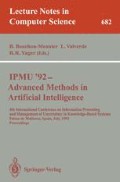Abstract
A recurring problem with the development of decision support systems in medicine is the difficulty of eliciting precise numerical uncertainty values for large fragments of the domain. A prototype information system for general practitioners, the Oxford System of Medicine (OSM), addressed this problem by using an informal mechanism of argumentation. Arguments supporting and opposing the propositions of interest were identified when numerical uncertainty values where unavailable. We propose, in this paper, a proof theoretic model for reasoning under uncertainty which is motivated by the need to provide a formal underpinning for the OSM inference engine. As well as giving a presentation of a “Logic of Argumentation” (LA) as a labelled deduction system, we also discuss the development of a category theoretic semantics for LA.
Preview
Unable to display preview. Download preview PDF.
References
S. Ambler: A Categorical Approach to the Semantics of Argumentation. Department of Computer Science Report, Queen Mary College, London (1992)
N. G. de Bruijn: Lambda Calculus Notation with Nameless Dummies, a Tool for Automatic Formula Manipulation, with Application to the Church-Rosser Theorem. Indagationes Mathematicae 34, 381–392 (1972)
T. Chard: Qualitative probability versus quantitative probability in clinical diagnosis: a study using a computer simulation. Medical Decision Making 11, 38–41 (1991)
R.M. Dawes: The robust beauty of improper linear models in decision making. American Psychologist 34, 571–582 (1979)
R. Dyckhoff: Contraction-free Sequent Calculi for Intuitionistic Logic. J. Symbolic Logic (to appear, 1992)
J. Fox, A.J. Glowinski, C. Gordon, S.J. Hajnal, M.J. O'Neil: Logic engineering for knowledge engineering. Artifical Intelligence in Medicine 2, 323–339 (1990)
J. Fox, D. A. Clark, A.J. Glowinski, M.J. O'Neil: Using predicate logic to integrate qualitative reasoning and classical decision theory. IEEE Trans. on Systems, Man, and Cybernetics 20, 347–357 (1990)
J. Fox, M. Clarke: Towards a formalisation of arguments in decision making. Proc. Stanford Spring Symposium on Argumentation and Belief. 92–99 (1991)
D. Gabbay: Labelled Deductive Systems. CIS Technical Report 90-22, University of Munich 1990
J.H. Gallier Logic for Computer Science. Chichester: John Wiley 1987
J. Girard, P. Taylor, Y. Lafont: Proofs and Types. Cambridge: Cambridge University Press 1989
A. Heyting: Intuitionism. An Introduction. Amsterdam: North-Holland Publ. Co 1956
J.R. Hindley, J.P. Seldin: Introduction to Combinators and λ-Calculus. Cambridge: Cambridge University Press 1986
G.M. Kelly: Basic Concepts of Enriched Category Theory. London Math. Soc. Lecture Note Series 64. Cambridge: Cambridge University Press 1982
J. Lambek, P.J. Scott: Introduction to higher order categorical logic. Cambridge: Cambridge University Press 1986
S.L. Lauritzen, D.J. Spiegelhalter: Local computations with probabilities on graphical structures and their application to expert systems. J. R. Statist. Soc. B. 50, 157–224 (1988)
J. Locke (1671). See: R.I. Aaron, J. Gibb (eds): An early draft of Locke's Essay. Oxford: Oxford University Press 1936
M. O'Neil, A.J. Glowinski: Evaluating and validating very large knowledge-based systems. Med. Inform. 15, 237–251 (1990)
G. Shafer: Non-additive Probabilities in the Work of Bernoulli and Lambert. Archive for History of Exact Sciences 19, 309–370 (1978)
P.N. Wilson: Justification, computational efficiency and generalisation of the Dempster Shafer Theory. Research Report no. 15, Dept. of Computing and Math. Sciences, Oxford Polytechnic 1989 (also to appear in Artificial Intelligence)
Author information
Authors and Affiliations
Editor information
Rights and permissions
Copyright information
© 1993 Springer-Verlag
About this paper
Cite this paper
Krause, P., Ambler, S., Fox, J. (1993). The development of a “Logic of Argumentation”. In: Bouchon-Meunier, B., Valverde, L., Yager, R.R. (eds) IPMU '92—Advanced Methods in Artificial Intelligence. IPMU 1992. Lecture Notes in Computer Science, vol 682. Springer, Berlin, Heidelberg. https://doi.org/10.1007/3-540-56735-6_48
Download citation
DOI: https://doi.org/10.1007/3-540-56735-6_48
Published:
Publisher Name: Springer, Berlin, Heidelberg
Print ISBN: 978-3-540-56735-6
Online ISBN: 978-3-540-47643-6
eBook Packages: Springer Book Archive

